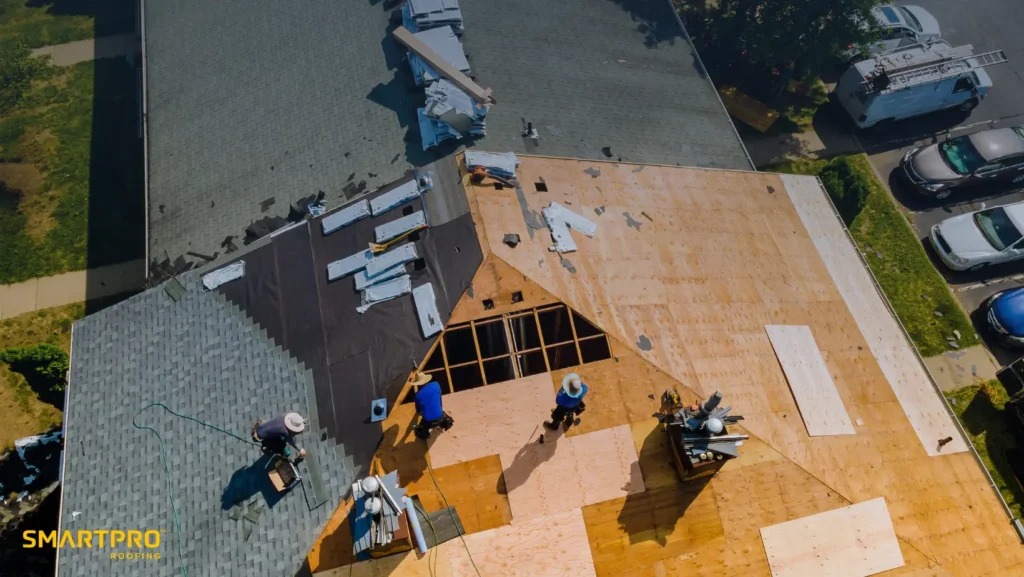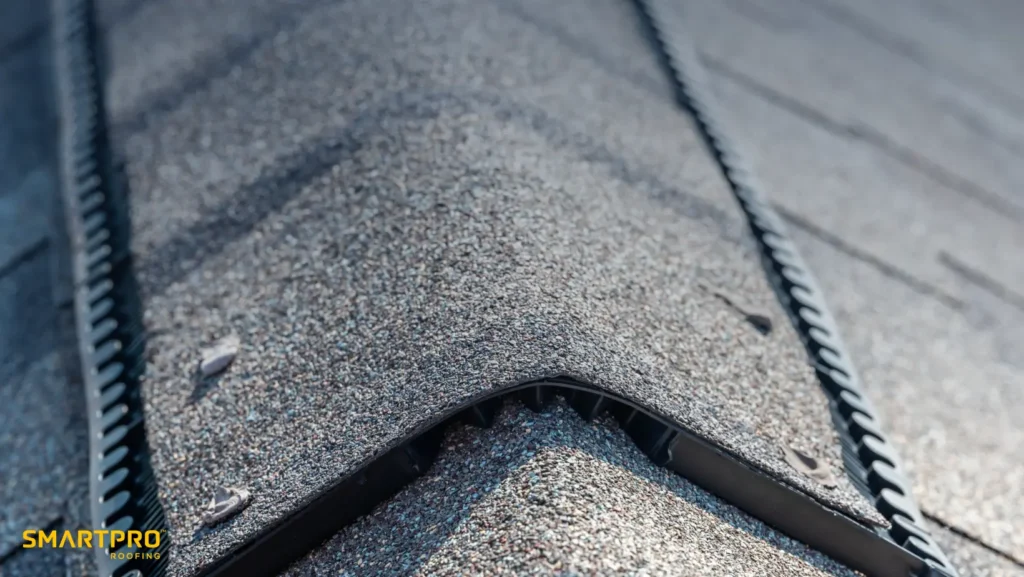Florida homeowners are no strangers to storm damage roofers. Whether it’s a hurricane, tropical storm, or just years of wear and tear, roof repairs are common across the Sunshine State. But when does a simple fix turn into a complete overhaul of your roof system or roof section?
That’s where Florida’s 25% roof replacement rule comes in. This regulation has major implications for homeowners, insurance companies, and contractors—especially following recent updates. If you’re unsure how this rule affects your existing roof or when you’re required to act, we’ve got you covered.
In this guide, we’ll explain what the 25 percent of the total rule means in plain English—how it works, how it’s changed, and what triggers full compliance with Florida building code roofing standards. Whether you’re replacing a roof or just exploring your options after a storm, our experts can help. If you’re located in Central Florida, our Lake County roofing team is standing by to assess your situation.
What Is the 25% Roof Replacement Rule in Florida?
The Florida 25 roof replacement rule refers to a legal threshold outlined in the edition of the Florida Building Code, requiring full roof replacement if 25% or more of the total roof area is damaged and the existing roof system does not comply with modern standards. The rule is enforced to ensure safety in high-wind areas and reduce long-term risks from partial repairs.
This requirement originally stemmed from the 2007 Florida Building Code, which stated that if more than 25 percent of the roof section of any existing building was being replaced or recovered in any 12-month period, then the entire existing building or structure shall be replaced to conform to requirements of the code. This ensures proper performance under severe weather conditions and futureproofs your home.
The Florida Building Commission, which governs code updates, introduced these requirements to ensure compliance with the requirements of the 2007 standard, especially for homes built before March 1, 2002. If more than 25 percent of the total roof or a part of the roof is damaged, and that roof section was built before modern codes were enacted, then the entire roof system must typically be brought up to code.
What Changed in the 2022 Update?

Before 2022, the requirements of the 2007 Florida rules were straightforward: if any roof section is being repaired or replaced and exceeds 25% damage, full replacement was mandatory—regardless of whether the existing roof was otherwise in good shape.
But recent revisions by the Florida Building Commission created more flexibility.
Under the updated edition of the Florida Building Code:
- If your existing roof system or roof was installed after March 1, 2002, and meets current building standards, you may be allowed to replace only the damaged roof area or roof section—even if damage exceeds 25%.
- For older homes or those with roofs that do not meet the requirements of the code, you’ll still be required to replace the entire roof section if over 25% is damaged within a 12-month period unless the entire roof is updated for compliance.
These changes help homeowners avoid unnecessary expenses while still prioritizing safety and durability. However, the requirements of the 2007 rule still apply in certain cases—especially for properties with older materials or multiple repair histories.
Why Does This Rule Matter to Homeowners?
The 25 percent roof rule in Florida isn’t just legal jargon—it directly affects repair costs, insurance decisions, and roof replacement law in Florida compliance. After a storm, a tree branch or hail might damage only a part of the roof—but if that damage crosses the 25% threshold, and your roof section is replaced, you could face a full reroofing bill.
To ensure your contractor is operating within legal guidelines, it’s essential to verify their licensing and credentials through the Florida DBPR (Department of Business and Professional Regulation).
Let’s walk through how the rule plays out depending on when your roof section was installed:
Scenario 1: You Own a Home Built in 2010
A severe storm damages around 30% of your roof section. Since your roof was built after the code change, and likely meets Florida roofing requirements, you may only need to repair the affected section. That saves you thousands in replacement costs—and avoids the need to fully bring your roof into compliance with the requirements of the code.
Scenario 2: You Own a Home Built in 1995
Now imagine the same level of damage—30% of your roof system. But since your existing roof was built before the requirements of the 2007 Florida Building Code, you’ll likely need to replace the entire thing. That’s because the roof section of any existing pre-2002 home that suffers more than 25 percent of the total roof damage must be replaced to conform to requirements of today’s stricter codes. And if more than 25% is recovered in any 12-month period, the structure shall be repaired in full for compliance.
This is where homeowners often run into issues with insurance companies. If the damage exceeds the threshold but the roof section is being repaired without updating the entire existing roof, your insurer may refuse coverage—or only approve a partial payout.
Florida’s roofing laws are complex, but knowing where your home stands in relation to the requirements of the 2007 Florida Building Code could save you significant money, time, and headaches. Not only that—it ensures your home is safe and storm-ready.
📍 Need help interpreting the rules? Contact us today for a free roof inspection and compliance review.
Other Situations Where the Rule Comes Into Play
- Buying or selling a home? If an inspection finds over 25% damage, the roof may need to be brought up to code before the sale is finalized.
- Landlords and property managers: Rental properties are subject to the same rules. Staying compliant protects your investment and ensures tenant safety.
- HOA communities: Some communities have stricter roofing standards layered on top of state law. Make sure you understand all applicable rules.
Why This Matters for Insurance
This rule is especially critical when filing a Florida roof insurance claim. If your insurer deems the roof damage percentage in Florida exceeds 25%, they may:
- Require you to replace the entire roof to meet code
- Deny a claim for partial repairs if your roof doesn’t meet standards
- Offer a lower payout if you opt for repairs that don’t comply
Knowing your rights and responsibilities under the Florida roof laws puts you in a stronger position when negotiating with your insurance provider. It can also help you qualify for tax benefits in the future if your replacement project uses energy-efficient roofing materials or meets certain federal standards, such as the residential energy credit.
How to Know If the 25% Rule Applies to You

If you’re unsure whether the roof replacement law in Florida affects your situation, here’s a checklist to guide you:
✅ Check the Age of Your Roof
Was your roof installed after March 1, 2002? If yes, it may already meet current building codes, meaning the 25% rule might not require full replacement.
✅ Know Your Local Codes
While Florida has a statewide code, your city or county may have additional roofing requirements. Always check with local building authorities or a trusted contractor.
✅ Measure the Damage
Damage doesn’t need to be exact—but if a professional estimates that more than 25% of your roof is affected, the law could come into play. This includes both visible and underlying structural issues.
✅ Consult a Licensed Contractor
Only a licensed roofing expert can determine if your roof meets code and if a full replacement is necessary. An inspection report is also helpful when dealing with insurance providers.
📍 Pro Tip: If you live in Lake County, our team at SmartPro Roofing is familiar with all local roofing laws. We’ll walk you through inspections, insurance paperwork, and ensure your home stays compliant with Florida’s latest roofing standards.
Staying Compliant with Florida Roofing Laws
To ensure your project aligns with state and local laws, follow these steps:
1. Work With Licensed Professionals
Hiring a licensed contractor who understands Florida roof laws and the latest code requirements is crucial. They’ll help you avoid costly mistakes and unnecessary full replacements.
2. Document the Damage
Take clear photos of all visible roof damage. This can strengthen your Florida roof insurance claim and provide evidence if there’s a dispute.
3. Get a Free Inspection
Not sure how much of your roof is damaged? A professional inspection will determine whether the 25% rule applies. Reach out now to schedule your free, no-pressure initial consultation.
4. Know When to File a Claim
Time matters. Waiting too long after damage occurs can complicate your insurance claim and put you at risk of non-compliance with Florida roofing requirements.
Summary: What Florida Homeowners Need to Know
The 25 percent roof rule in Florida isn’t just a number—it’s a legal guideline with real implications for your home, finances, and peace of mind. Here’s a quick recap:
- If more than 25% of your roof is damaged and it doesn’t meet code, a full replacement is required.
- Roofs installed after March 1, 2002, may be exempt if they meet the current Florida Building Code.
- The rule affects insurance claims, contractor decisions, and your ability to remain compliant.
- Always consult a qualified roofer before making decisions.
Thinking about replacing a roof or not sure if your home falls under the 25% rule? Contact us today for a free inspection and expert guidance on your next steps.
Frequently Asked Questions
What is the 25 percent roof rule in Florida?
It’s a state regulation that requires roof replacement if more than 25% of your roof is damaged and the current roof doesn’t meet updated building codes.
Does the 25% rule apply to all homes?
No. Homes with roofs installed after 2002 that meet code may not be required to fully replace the roof, even if the damage exceeds 25%.
How does this rule affect my insurance?
The rule can impact whether your insurer pays for a full replacement or only repairs. It’s essential to understand your policy and work with a contractor familiar with Florida building code roofing standards.











